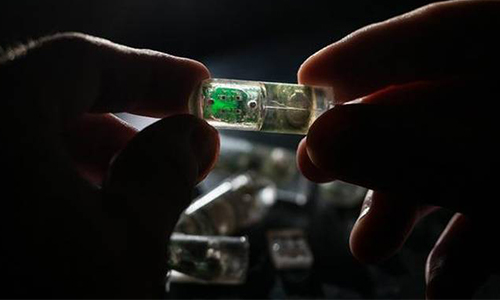Ingestible Sensor To Diagnose Gastrointestinal Diseases
May 29, 2018
Source: drugdu
 736
736

To diagnose any kind of gastrointestinal problems, an ingestible sensor equipped with a genetically engineered bacteria was developed by an MIT research team. This ‘bacteria-on-a-chip’ combined sensors with ultra-low-power electronics, which could convert the bacterial response into a wireless signal that can be read by a smartphone.
Anantha Chandrakasan, the dean of MIT’s School of Engineering said, “The focus of this work is on system design and integration to combine the power of bacterial sensing with ultra-low-power circuits to realize important health sensing applications.”
The research team from MIT designed sensors that could respond to heme - a component of blood. They engineered a probiotic strain of E. coli to deliver a genetic circuit. When the bacteria encounter heme, it would emit light and the information would reach the microprocessor, which sends a wireless biological signal to a nearby computer or smartphone. The research team built an Android app in order to analyze the data. They also loaded the sensor with a 2.7-volt battery, so that the device could be used continuously for about 1.5 months.
This research work was done to detect the bleeding in the stomach region. It can either be applied for one-time use or remain in the digestive tract for several weeks.
By DduRead more on
- Things to Know before Buying Newborn Baby Incubators March 31, 2022
- Highly Resistant Food Poisoning Bug Responds to Antibiotics September 6, 2018
- Smartphone Based Diagnosis to Identify Mosquitoes Transmitting Infection September 5, 2018
- 3 Natural Plant Extracts Manufacturers on Drugdu.com September 4, 2018
- Shenzhen Chuanggan – Health Assessment Facility Supplier September 4, 2018
your submission has already been received.
OK
Subscribe
Please enter a valid Email address!
Submit
The most relevant industry news & insight will be sent to you every two weeks.



